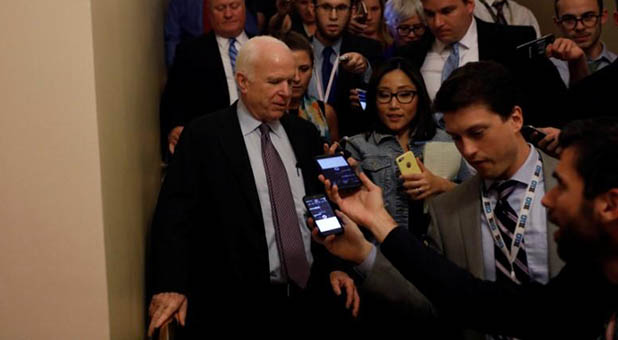Do We Need 62 Republicans in the Senate?
The votes over health care legislation in the U.S. Senate on Thursday were quite telling.
Not only do we now know where every senator stands on issues ranging from the full repeal of Obamacare, elimination of Expanded Medicaid, defunding Planned Parenthood and even implementation of the dreaded single-payor system, but we now have a good idea of what it will take to get anything positive accomplished. The moral of that story: if we have to rely on Republicans alone to see our legislative goals accomplished, we’re going to need at least 60 of them.
And, with two of the current Republicans’ voting habits, we might as well make it 62.
The main headline this morning is that senators failed to pass the so-called “skinny repeal” bill that would have forced the American Health Care Act to a conference committee with the House of Representatives, 51-49. Sens. Susan Collins, R-Maine; John McCain, R-Ariz.; and Lisa Murkowski, R-Alaska—as well as all 46 Democrats and the Senate’s two independents—all voted against the measure.
The eight-page “skinny repeal” bill would have amended the House’s American Health Care Act down to one that:
- eliminates the so-called “individual mandate” that requires all Americans to have health insurance coverage;
- eliminates the so-called “employer mandate” that all employers with a certain number of employees are required to provide health insurance coverage to those employees, but only for eight years;
- eliminates the Obamacare taxes on medical devices, but only for three years;
- increases the maximum tax-free contributions to health savings accounts;
- defunds Planned Parenthood and other abortion providers for one year;
- appropriates an additional $422 million to combat opioid addiction through the Community Health Center Program;
- retains “state Medicaid innovation” funding; and
- provides a $2 billion “market stabilization” fund to keep health insurers from leaving the individual marketplace and attempt to keep premiums lower.
The new legislation would carry the name American Health Freedom Act.
Collins and Murkowski had always been “no” votes, as both had vowed to work with Democrats in committee, and Collins was actually working in the background with Sen. Bill Nelson, D-Fla., on a bill of her own. McCain was, very literally, the swing vote that prevented the bill from passing. Vice President Mike Pence, who arrived during the early morning hours Friday to cast the potential tiebreaking vote, if necessary, was seen lobbying the senator on the floor before he cast the decisive vote.
Initially, he refused to comment, saying he merely “did his job” as a senator, but his office later released the following statement:
From the beginning, I have believed that Obamacare should be repealed and replaced with a solution that increases competition, lowers costs and improves care for the American people. The so-called “skinny repeal” amendment the Senate voted on today would not accomplish those goals. While the amendment would have repealed some of Obamacare’s most burdensome regulations, it offered no replacement to actually reform our health care system and deliver affordable, quality health care to our citizens. The Speaker’s statement that the House would be ‘willing’ to go to conference does not ease my concern that this shell of a bill could be taken up and passed at any time.
I’ve stated time and time again that one of the major failures of Obamacare was that it was rammed through Congress by Democrats on a strict-party line basis without a single Republican vote. We should not make the mistakes of the past that has led to Obamacare’s collapse, including in my home state of Arizona where premiums are skyrocketing and health care providers are fleeing the marketplace. We must now return to the correct way of legislating and send the bill back to committee, hold hearings, receive input from both sides of aisle, heed the recommendations of nation’s governors and produce a bill that finally delivers affordable health care for the American people. We must do the hard work our citizens expect of us and deserve.”
The statement from Speaker of the House Paul Ryan, R-Wis., to which he alluded was in response to a statement in which McCain joined with Sens. Lindsey Graham, R-S.C., and Ron Johnson, R-Wis., in which they threatened to vote “no” on the bill if they weren’t guaranteed that the bill wouldn’t just get an automatic vote from the House. They insisted the bill had to go automatically to conference committee to get their vote.
A short time later, Ryan’s office released the following statement:
Senators have made clear that this is an effort to keep the process alive, not to make law. If moving forward requires a conference committee, that is something the House is willing to do.
Although Graham and Johnson took him at his word, the liberal mainstream media called it “ambiguous,” suggesting House Republicans would try to wiggle out of being forced to go to conference committee. McCain seemed to agree, based on his vote and his statement afterward.
The end result was nothing short of a major victory for Democrats, who have insisted since last November they would “fight tooth and nail” to maintain Obamacare. It’s not yet clear how the Senate will attempt to proceed from here.
“This thing we tried to pass tonight?” Senate Republican Conference Chairman John Thune, R-S.D., the Senate’s third-ranking Republican, said after the vote. “If you can’t get all Republicans to agree to that stuff, I’m not sure what we’re going to pass with Republicans.”
President Donald Trump didn’t hide his disappointment, either, tweeting:
3 Republicans and 48 Democrats let the American people down. As I said from the beginning, let ObamaCare implode, then deal. Watch!
While the “skinny repeal” vote was perhaps the most important, there were several other telling votes taken by the Senate on Thursday. They included:
- The Daines Amendment—Sen. Steve Daines, R-Mont., crafted an amendment that was a word-for-word duplication of a House Democrats bill to create a single-payor health care system in the U.S. Daines opposes single-payor health care, but wanted to expose the Democrats’ hypocrisy on the issue. The measure failed 57-0 with five Democrats voting “no” and the remaining voting “present.”
- The Strange Amendment—Sen. Luther Strange, R-La., crafted an amendment would not only defund Planned Parenthood but remove its built-in protections in the Congressional Budget Act. Doing so, however, is a violation of the CBA, which requires 60 votes to enact a waiver, which then would have allowed a regular majority vote to pass. The vote to waive the provisions of the CBA failed on a 50-50 vote with Collins and Murkowski voting against.
- The Countering America’s Adversaries Through Sanctions Act—The House crafted this bill to impose sanctions simultaneously on Russia, North Korea, and Iran, and to prohibit the president from easing them without congressional approval. The Senate adopted the bill 98-2 with Sens. Bernie Sanders, I-Vt., and Rand Paul, R-Ky., voting against. It previously passed the House on a 419-3 vote.
That gets us back to that magic number of 60.
The Senate’s arcane rules require a three-fifths majority—that’s 60 votes—to force overwhelming support for most pieces of legislation before they can be passed. This also includes rules for waiving certain requirements, and even for rewriting the rules.
In the past, Democrats have worked in a unified manner to bypass those rules to quickly advance their agenda. Republicans, on the other hand, have found it nearly impossible to find the necessary unity in order to roll back those measures. For some, they insist on voting their principles, and for others, it’s a matter of being a wolf in sheep’s clothing—or, simply put, they’re Republicans In Name Only, or RINO, to use the most common derisive term.
Murkowski has even taken her opposition to new levels, putting “holds” on the president’s nominees for the Energy and Interior departments. She chairs the Senate Committee on Energy and Natural Resources.
Collins was caught earlier this week in a “hot mic” conversation with a Democrat in which the president was called “crazy.”
Clearly, Collins and Murkowski meet the textbook definition of RINO, but replacing them with “real Republicans”—or, more accurately, conservative Republicans—can’t happen until 2022 and 2020, when they are respectively up for re-election. To counter their votes, we may need 62 Republicans in the Senate before we’re able to get any positive movement on our agenda.
That could happen as soon as 2019, following the 2018 election. Ten Democrats from “red states” that voted for the president last November are up for re-election that year.




























































